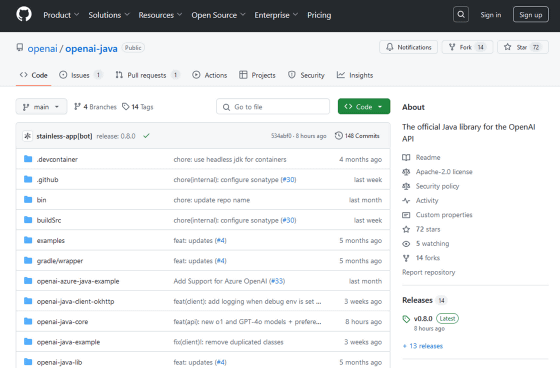OpenAI releases a large amount of new information, including 'OpenAI o1 API release', 'Voice conversation API price reduction', and 'Java and Go library release'

OpenAI has released the API for '
OpenAI o1 and new tools for developers | OpenAI
https://openai.com/index/o1-and-new-tools-for-developers/
Our reasoning model @OpenAI o1 is now in the API! It comes with function calling, developer messages, Structured Outputs, and vision. 🍓
— Romain Huet (@romainhuet) December 17, 2024
We also shipped WebRTC support for the Realtime API, Preference Fine-Tuning, official Go/Java SDKs, and more! 🎁 https://t.co/lk9v3u5G4N
◆OpenAI o1 API Released
The OpenAI o1 API supports text and image input, with a context window of 200,000 tokens and a maximum output of 100,000 tokens. The OpenAI o1 training data includes information up to October 2023.

Below is a graph comparing the performance of 'GPT-4o (light orange)', 'OpenAI o1-preview (orange)', 'OpenAI o1 (pink)', and 'OpenAI o1 structured output mode (red)'. OpenAI o1 has the highest scores in various benchmarks.

The OpenAI o1 API supports a parameter called 'reasoning_effort' that allows you to adjust the time spent on inference. In addition, it can respond to specific requests with an average of 60% fewer inference tokens than OpenAI o1-preview, and also supports functions such as 'function calls,' 'output in JSON format,' 'image inference,' and 'developer messages.'
The OpenAI o1 API is already open to Tier 5 developers, with availability set to expand over the coming weeks.
We're bringing OpenAI o1 to the API. We're rolling out access to developers on usage tier 5 starting today, and rollout will continue over the next few weeks.
pic.twitter.com/Ax8TT0IRke — OpenAI Developers (@OpenAIDevs) December 17, 2024
o1 supports:
⚙️ Function calling
🗂️ Structured Outputs
👀 Vision
📝 Developer messages
🧠 Reasoning effort
◆Realtime API Updates
The Realtime API is an API that uses AI to provide voice conversation functions. The Realtime API now supports WebRTC, making it easy to build real-time voice conversation apps across platforms such as web apps, mobile devices, and IoT devices. The following document summarizes how to use WebRTC with the Realtime API.
Realtime API with WebRTC - OpenAI API
https://platform.openai.com/docs/guides/realtime-webrtc

In addition, 'gpt-4o-realtime-preview-2024-12-17' and 'gpt-4o-mini-realtime-preview-2024-12-17' have also been released, which improve voice quality while reducing costs. The price of 'gpt-4o-realtime-preview-2024-12-17' is $40 (about 6,100 yen) per million voice input tokens, $80 (about 12,000 yen) per million voice output tokens, and $2.5 (about 380 yen) per million cached voice input tokens. In addition, the price of 'gpt-4o-mini-realtime-preview-2024-12-17' is $10 (approximately 1,500 yen) per million tokens of voice input, $20 (approximately 3,100 yen) per million tokens of voice output, and $0.3 (approximately 46 yen) per million tokens of cached voice input.

◆Preference Fine-Tuning
Preference Fine-Tuning is a model fine-tuning method that uses an approach called ' Direct Preference Optimization (DPO) '. By using Preference Fine-Tuning, it is possible to 'output two responses of the model and have it learn to distinguish between preferred and unpreferred responses'. This allows fine-tuning based on the preferences of users and developers.
preference fine-tuning, you can tell the model what to do and what not to do 😎 https://t.co/hdjcDtwAv4
— Karen Li (@karen_li6) December 17, 2024
Details of Preference Fine-Tuning are summarized at the following link.
Fine-tuning - OpenAI API
https://platform.openai.com/docs/guides/fine-tuning#preference

Go and Java libraries
OpenAI has released official libraries for TypeScript/JavaScript, Python, and .NET. New libraries for Go and Java have also been released.
The official Go library is available at the following link:
GitHub - openai/openai-go: The official Go library for the OpenAI API
https://github.com/openai/openai-go

In addition, the official Java library is available at the following link:
GitHub - openai/openai-java: The official Java library for the OpenAI API
https://github.com/openai/openai-java

Related Posts:







